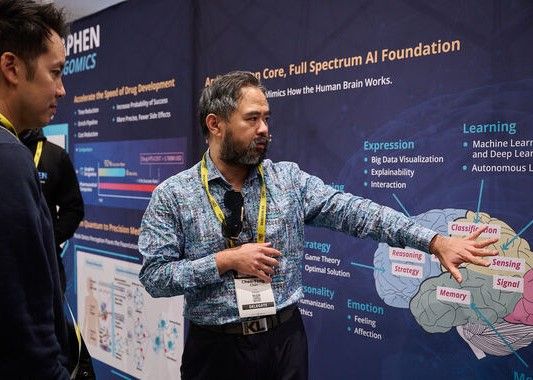AI has emerged as the central point of interest, captivating the attention of global business leaders. Generative AI is leading us further into a fresh era of innovation and potential. Financial institutions are actively exploring the value that AI holds for them. As many institutions struggle with the task of industrializing AI into practical use, through this session, we’ll share real-life examples to activate analytics strategies and explore the tangible benefits it brings to organizations, ranging from operational efficiency to enhanced client experiences and insights-led decision-making, all while effectively managing potential risks and safeguarding data privacy.
- Chair: Harish Arora, Managing Director, Financial Services Technology Consulting Practice, Ernst & Young LLP
- Speaker: Shannon Favazza, Principal and Head of Analytics - Edward Jones
Introduction:
This panel discussion covered the adoption and acceleration of AI across the financial services industry, with a focus on Edward Jones' approach. Shannon Favaza, a principal at Edward Jones responsible for AI strategy, shared insights on how the firm defines AI, its potential to augment advisor productivity, and lessons learned in implementing AI initiatives. Key points included centralizing decision-making, obtaining C-suite sponsorship, creating experiences to build trust, focusing on human use cases, and addressing mindsets, skillsets, and toolsets for successful AI transformation. The discussion also highlighted the importance of a strong data foundation, robust analytics governance, and avoiding dystopian fears around AI's impact on employment.
Harish Arora:
I'm thrilled to be joined by Shannon Favazza. Can you tell us a little bit about yourself and Edward Jones?
Shannon Favazza:
I'm a Principal at Edward Jones, responsible for AI and strategy. Edward Jones is a wealth management firm managing over two trillion in assets across North America with a significant presence in many regions.
Defining AI in Financial Services
Harish Arora:
Let's talk about AI. What is AI to you, and how do you define it within your organization?
Shannon Favazza:
We think of AI as computer systems capable of performing human-like tasks. At Edward Jones, we also view AI as “Advisor Intelligence,” which emphasizes the human side of the equation. AI acts as a co-pilot to advisors, helping them become more productive by automating routine tasks and allowing them to focus on what they do best.
AI's Role in Scaling Financial Services
Harish Arora:
In a world where AI can do almost anything, what are you focusing on, and how is AI being used to scale in your business?
Shannon Favazza:
AI is a huge productivity accelerator, especially in areas like strategic analysis and ideation. With AI, financial advisors can serve more clients effectively, providing financial advice to those who might not have had access to it otherwise.

Creating a Culture of Accountability in AI
Harish Arora:
How did you establish a system of accountability for AI, especially in such a large organization?
Shannon Favazza:
Centralizing decision-making and obtaining C-suite sponsorship were key. We streamlined AI initiatives through one channel, assessing feasibility and focusing on the most critical use cases. This helped us move quickly and in a way that aligns with our overall strategy.
Engaging the C-Suite for AI Success
Harish Arora:
How did you drive momentum within the C-suite for AI initiatives?
Shannon Favazza:
We found a natural sponsor in the C-suite—our Chief Strategy Officer—who saw AI's potential and championed it across the firm. Additionally, we created AI experiences for the leadership team, such as avatars of C-suite members, to demonstrate AI's impact and bring the future into the present.
Choosing the Right AI Projects
Harish Arora:
How did you choose your proof of concepts (POCs) to ensure AI success?
Shannon Favazza:
We focused on human use cases first, prioritizing projects that would increase trust and transparency in AI. By embedding AI into workflow design in an intuitive way, we aimed to drive high adoption and value creation.
Transforming Mindsets, Skillsets, and Toolsets
Harish Arora:
It sounds like you took a holistic approach to AI transformation. Can you expand on that?
Shannon Favazza:
Absolutely. We addressed mindsets, skillsets, and toolsets. Changing how people think about AI is crucial for trust, and providing the right tools helps integrate AI seamlessly into daily work. These elements ensure that AI is adopted and beneficial across our organization.

Avoiding AI Failure and Achieving Long-Term Success
Harish Arora:
Many AI projects fail. What did you do differently to improve the success rate of your AI projects?
Shannon Favazza:
We avoided scattered efforts by centralizing our strategy and prioritizing sustainable, scalable projects over experimental ones. This helped us ensure that the projects we pursued had long-term value.
Excitement About AI's Future in Financial Services
Harish Arora:
What excites you most about AI's future?
Shannon Favazza:
I’m excited about AI as a co-pilot in industries like healthcare and financial advice, where AI can help solve real-world problems and make services more accessible. The future holds immense possibilities for how AI will shape these fields.
Harish Arora:
What was your last ChatGPT query?
Shannon Favazza:
I used it to craft talking points for this discussion and also helped my seventh-grader with her history homework late at night!
Harish Arora:
What would you write a book about if you could?
Shannon Favazza:
I’d write about how humans aren’t going out of fashion—our work is evolving, and we’ll continue to add value in new ways alongside AI.
Find Out More
Be part of the action at The AI Summit New York.
Or read up on our AI in Finance series.
)

)
)


)
)

)

)
)
)
)
)
)
)
)
)
)
)
)

)
)
)

)
)
)
)
)

)
)
)

)
)
)
)
)

)
)
)
.svg)

)
)
)
)
)

)
)
)
)

)
)
)
)
)
)
)
)
.jpg/fit-in/500x500/filters:no_upscale())
)


)
)
)
)
)
)
)
)
)
)
)
)

)
)
)
)
)
)
)
)
)
)
)
)
)
)